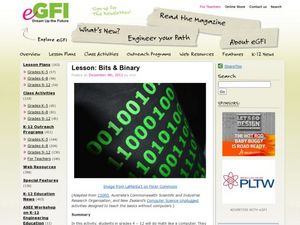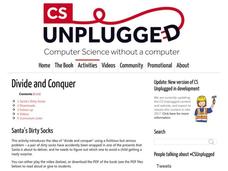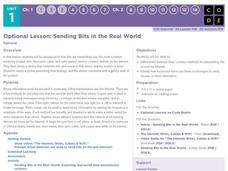Code.org
Number Systems
Generating a system of shapes. Groups work together to create a number system using three different shapes as symbols. The groups should come up with the rules that generate all the possible permutations of the three shapes.
eGFI
Bits & Binary
Youngsters love to write on their hands, and in this fabulous activity they are actually asked to. Using numbers written on the tips of their fingers, they will learn how the binary number system works. This hands-on activity is a...
Code.org
Binary Numbers
All you need is a zero and a one. Build pupils' understanding of binary values and number systems to gain familiarity with binary numbers. Using a hands-on activity and technology, scholars learn how the binary system works and its...
Code.org
Sending Binary Messages
Pairs build a device that will be able to send a binary message. They then update their device to allow it to send four possible messages before upping the ante to eight. The provided self-assessment rubric comes with reflection...
Institute of Electrical and Electronics Engineers
Binary Basics
Back to the (binary) basics. The resource provides a simple overview of binary code and gives two different activities to introduce it to elementary and middle school learners. Classmates write and decode messages to each other in binary...
Code.org
Encoding Numbers in the Real World
Ah, the numerous number of numbers. Individuals research different ways of encoding numbers. After conducting their initial research, they find classmates who have researched a different article and the pair share information. The...
Code.org
Sending Binary Messages with the Internet Simulator
Show your class how to develop a protocol to solve a problem. Pupils then continue with working with binary messages but refine a protocol to assist with the distinction of individual bits by including a bit rate. Finally, the pairs...
Computer Science Unplugged
Codes in a Song—Modems
Let's listen to some codes. To understand how a modem sends binary numbers over a phone line, class member listen to the codes included in the provided mp3 files, translates the tones to binary numbers and then convert the...
Computer Science Unplugged
Divide and Conquer—Santa’s Dirty Socks
The story "Santa's Dirty Socks" provides learners an example of a search algorithm that uses a divide and conquer system similar to a binary search algorithm. The included questions expand upon the concepts that follow the story.
Curated OER
Binary Math
In this physics worksheet, students perform a series of mathematical operations involving binary numbers to answer 11 questions.
Code.org
Sending Numbers
Binary graphing ... bit by bit. Pairs work together to develop a protocol in order to send the points of a graph. One partner sends the points and the other receives them and tries to recreate the graph. The pupils use the rubric to...
Curated OER
Zeros and Ones
Students review counting, the number system and the decimal number system. They rotate through three stations, "How RAM Works, "Binary Numbers" and "Binary Letters." They complete three separate worksheets to check for complete...
Curated OER
Binary and Communication Systems
Students participate in an activity that introduces them to the concept of binary coding as a language. They decode messages using special boards that has its own code for different letters. They create new codes by rearranging wires...
TryEngineering
Data Representation: Millions of Colors
How many colors do you know? The lesson teaches scholars how digital devices use binary and hexadecimal representations to store colors. They learn how millions of colors are available on these devices.
Curated OER
Review of Pointers
For this programming worksheet, students answer 50 multiple choice and true or false questions on functions and binary numbers.
Code.org
Practice PT - Encode an Experience
Encoding What I did Last Summer. Class members develop a way to encode a personal experience using a top-down approach to determine components and sub-components of their experience They then pick one portion of the experience and go...
College Board
AP® Computer Science: A Picture Lab Student Guide
How do you modify digital pictures? In this lab learners write methods that modify digital pictures. They how to traverse a two-dimensional array of integers or objects, and are introduced to nested loops, binary numbers,...
Code.org
The Need for Addressing
You sunk my battleship via the Internet? Groups of three play a modified game of Battleship using the Internet Simulator. Team members determine how to address messages, so each player knows who the message is for, and refine their text...
Code.org
Sending Bits in the Real World
A bit optional. How do computers transmit in the real world? Pupils research a device that is used in transmitting bits, then individuals create a poster that presents the information they have learned about their device.
Curated OER
6.1 Computing Components
Students define computer terms such as hardware, software, input and output devices, central processing unit, etc. in their own words, and relate terms to computer system they are using.
Curated OER
Transistor Hunt
Students locate transistor devices in school. They explain the importance of transistors.




















